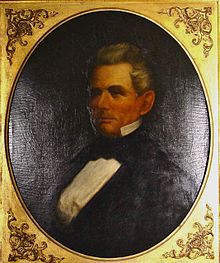Andrew B. Moore
Andrew Barry Moore (born March 7, 1807 in Spartanburg County , South Carolina , † April 5, 1873 in Marion , Perry County , Alabama ) was an American politician ( Democratic Party ) and the 16th governor of Alabama .
Early years and political advancement
Moore moved with his family to Perry County, Alabama, in 1823; however, he returned to South Carolina to complete his education. He then went back to Alabama in 1826 and taught in Marion for two years. After that began Moore Law to study and was admitted to the bar in 1833. He then served as a justice of the peace in Perry County for eight years . Moore decided in 1842 to embark on a political career. He was elected to the Alabama House of Representatives, where he served until 1845. He was also Speaker of the House of Representatives from 1843 to 1845 , and a presidential elector for the Whig Party in 1848 . Governor Henry W. Collier called Moore to the District Court in 1851 to fill the vacancy there.
Governor of Alabama
Moore served in the district court until 1857 when he accepted the Democratic nomination for governor of Alabama. He was elected 16th Governor of Alabama on August 3, 1857 without opponents. He was sworn in on December 1, 1857. During his tenure, the education system and internal political innovations received his outstanding attention. The Medical College of Alabama was established and the Institute for the Deaf and Blind was established in Talladega . He also advocated state welfare and federal grants to promote railroad construction.
Moore was deemed to be moderate on the slavery issue when he was re-elected for another term on August 1, 1859. During his second term, a state convention was convened to discuss secession issues and Alabama's troops were ordered to occupy the state army fortifications. Parliament made $ 500,000 available for defense. In addition, $ 3 million was granted in aid to offset the war debt. As Alabama's 1819 constitution prevented further re-election, Moore resigned on December 2, 1861.
Another résumé
He then became Special Adjutant to Governor John Gill Shorter , who coordinated the acquisition and transportation of supplies to General Albert S. Johnston in northern Alabama. Moore was arrested by Union forces when Lee's surrender at Appomattox followed. He was jailed with other Confederate leaders at Fort Pulaski in Savannah , Georgia , and was not released until August 1865 because of dwindling health. Moore returned to Marion, where he resumed his practice as a lawyer and continued until his death on April 5, 1873. He was married to Mary Goree and they had four children together.
literature
- Robert Sobel and John Raimo (Eds.): Biographical Directory of the Governors of the United States, 1789–1978. Volume 1, Meckler Books, Westport, 1978. 4 volumes.
Web links
- Andrew B. Moore in the database of Find a Grave (English)
| personal data | |
|---|---|
| SURNAME | Moore, Andrew B. |
| ALTERNATIVE NAMES | Moore, Andrew Barry (full name) |
| BRIEF DESCRIPTION | American politician, 16th Governor of Alabama |
| DATE OF BIRTH | March 7, 1807 |
| PLACE OF BIRTH | Spartanburg County , South Carolina |
| DATE OF DEATH | April 5, 1873 |
| Place of death | Marion , Alabama |

